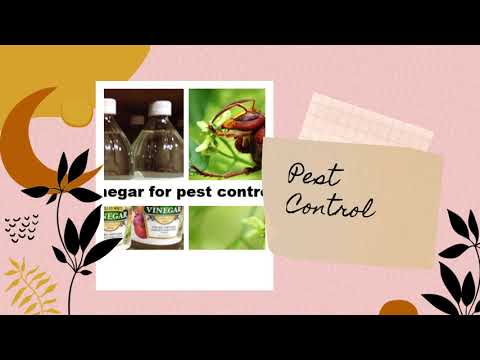Do you know what apple cider vinegar is?
Well I bet you only know that they belong to the kitchen…
Indeed they are, but there’s more to them than that…
They can actually be used in the garden as well!
Hear it from Ryland!
I love cooking in the kitchen and also gardening in the garden…
And the best thing yet, they can both be combined to my advantage!
How you may ask, the ingredients in the kitchen are favorable for the garden…
Most of the ingredients, such as citrus, vinegar, and food waste…
… can all benefit the garden in one way or another.
I especially love the apple cider vinegar…
… since they are capable of being rooting hormones, fertilizer…
… and pesticide among other stuffs!
Are you like Ryland?
Whether or not you are, this article is here to provide you…
… with all the necessary information you can benefit…
… from knowing the uses of apple cider vinegar in your garden!
Plus, they are very easy to make by yourself…
… if you don’t want to spend money for a manufactured one.
Making vinegar is easy: you take fruit, add water and wait. Three or four months later, you’ll have vinegar. Of course there are subtleties to this process, but the basic method is simple.
Alys Fowler from The Guardian
But first…
What Is Apple Cider Vinegar?
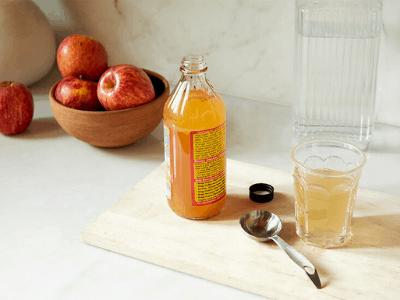
- BRAGG APPLE CIDER VINEGAR: Made from organically cultivated apples, Bragg ACV Vinegar has a variety of health advantages. Take a daily 2 oz shot, pour it over your salad, drink it in a morning elixir with water and lemon, or add it to your hot tea to simply integrate ACV into your diet.
- ORGANIC INGREDIENTS: Bragg ACV is made from organically cultivated apples and is raw, unfiltered, and unpasteurized. It's organically certified by the USDA, non-GMO verified, and kosher certified.
- MOTHER OF VINEGAR: The 'Mother,' which gives the product its murky color, is made up of strands of proteins, enzymes, and friendly microorganisms. The 'Mother' is used for its purifying properties.
- HEALTH BENEFITS OF APPLE CIDER VINEGAR: Taking a regular dose of Bragg Organic ACV has numerous health benefits. ACV can support a healthy immune system, help you maintain a healthy weight, offer prebiotics, and keep your blood sugar levels in check.
- The Bragg Difference: For vigorous health, a diet rich in organic fruits and vegetables is necessary. Our ingredients are always sourced from nature, never from a laboratory. It's what sets us apart. With the Bragg Live Food Products Authenticity Seal
Prices pulled from the Amazon Product Advertising API on:
Product prices and availability are accurate as of the date/time indicated and are subject to change. Any price and availability information displayed on [relevant Amazon Site(s), as applicable] at the time of purchase will apply to the purchase of this product.
- BRAGG APPLE CIDER VINEGAR: Made from organically cultivated apples, Bragg ACV Vinegar has a variety of health advantages. Take a daily 2 oz shot, pour it over your salad, drink it in a morning elixir with water and lemon, or add it to your hot tea to simply integrate ACV into your diet.
- ORGANIC INGREDIENTS: Bragg ACV is made from organically cultivated apples and is raw, unfiltered, and unpasteurized. It's organically certified by the USDA, non-GMO verified, and kosher certified.
- MOTHER OF VINEGAR: The 'Mother,' which gives the product its murky color, is made up of strands of proteins, enzymes, and friendly microorganisms. The 'Mother' is used for its purifying properties.
- HEALTH BENEFITS OF APPLE CIDER VINEGAR: Taking a regular dose of Bragg Organic ACV has numerous health benefits. ACV can support a healthy immune system, help you maintain a healthy weight, offer prebiotics, and keep your blood sugar levels in check.
- The Bragg Difference: For vigorous health, a diet rich in organic fruits and vegetables is necessary. Our ingredients are always sourced from nature, never from a laboratory. It's what sets us apart.
Prices pulled from the Amazon Product Advertising API on:
Product prices and availability are accurate as of the date/time indicated and are subject to change. Any price and availability information displayed on [relevant Amazon Site(s), as applicable] at the time of purchase will apply to the purchase of this product.
Apple cider vinegar is a type of vinegar made by…
… crushing apples and fermenting them with yeast and sugar.
The process begins by pressing the apples…
After that, sugar and yeast are added to the mix to start the fermentation process…
In a second fermentation process involving acid-forming bacteria…
… that results in the production of vinegar, the alcohol from the sugar is transformed into vinegar.
Use ACV As Rooting Hormone
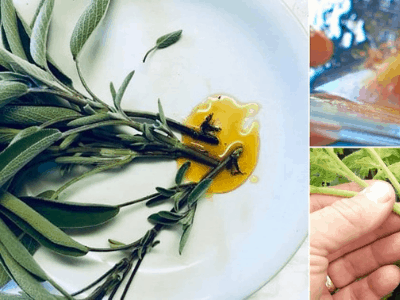
You only need a small amount of apple cider vinegar to make this organic rooting hormone…
… and too much could prevent it from spreading.
Apple cider vinegar is one of several types of vinegar that are used in gardening…
One teaspoon of vinegar in five to six cups (1.2 to 1.4 liters) of water is enough…
Any type of apple cider vinegar at your local supermarket is fine…
If you want to use your own rooting hormone…
… just dip a cutting into the homemade solution prior to “sticking” it in rooting medium.
It is a great way to give your cuttings the extra boost they need…
… to grow roots using apple cider vinegar as rooting hormone.
Other ACV Uses
Fertilizer
White vinegar is commonly used as a herbicide…
- Why Customers Choose Lucy’s Vinegar - From cleaning to cooking, Lucys 5% Distilled White Vinegar is simply the right choice! Because of our Vinegars bargins, absence of preservatives, durable bottle design, secure seal, and Kosher Certification, customers around the country have fallen in love with Lucy’s vinegar!
- Cooking - Spices up dipping sauces, develops flavor, makes homemade bread crusts golden brown, freshens wilted vegetable’s, substitutes for salt or buttermilk and can be used for much much more!
- Cleaning - Yes! White Vinegar for cleaning works fantastically. Check out some of our customer reviews to see how theyve applied our Vinegar for their cleaning needs.
- We Love What We Do - One of the sweetest fruits of our labors are the responses we receive from our customers all over the country. Whether it’s simply to dress up a vinaigrette, enhancing pastries, or cleaning the restaurant counters, we stand amazed at the usefulness and enjoyment that Lucy’s White Vinegar brings each of our neighbors.
- Family Owned & Family Run - Here at Lucys, we seek to achieve one purpose: To love God with all of our heart & to love our neighbors as we love ourselves. From our family to yours, thank you for being one of our cherished custome
Prices pulled from the Amazon Product Advertising API on:
Product prices and availability are accurate as of the date/time indicated and are subject to change. Any price and availability information displayed on [relevant Amazon Site(s), as applicable] at the time of purchase will apply to the purchase of this product.
However, not all vinegar types are effective as a fertilizer…
The application of apple cider vinegar does, however…
… have positive effects on plant growth.
Acid-loving plants such as azaleas, rhododendrons, blueberries, and gardenias…
… can benefit from its acid content since it is 5 percent acid.
If you want to use apple vinegar for this purpose…
… be sure that the vinegar is organic, raw, and unfiltered, because it contains the pulp…
… which has the maximum amount of nutrients for your plants.
Ten ounces of apple cider vinegar (5% concentration) should be added to a ten-gallon bucket…
The bucket must be filled with water and stirred well…
Water the roots of the plant using a watering can or sprayer…
Avoid watering the leaves of the plant as it could lead to wilting and burn…
Clean Plant Leaves
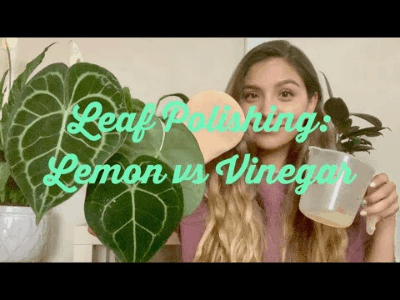
Dirt can accumulate on indoor plants’ leaves, affecting growth and photosynthesis…
To avoid this, you should regularly clean them…
This ACV use in the garden is this – Mix one teaspoon of vinegar into one gallon of water…
… dip a soft cloth in the solution and gently apply the vinegar solution to dirty leaves.
It will clean the foliage and deter pests like scales and mites…
DIY a Fruit Fly Trap
A common nuisance to every gardener, fruit flies are easy to get rid of…
… with a solution of half cup apple cider vinegar, one tablespoon of molasses…
… a quarter cup of sugar, and one cup of water.
The ingredients should be mixed thoroughly and poured into some containers…
… which should then be hung at strategic places.
It will act as a bait and entice the fruit flies to swarm around it…
… so make sure the dead flies are removed frequently.
Get Rid of Slugs
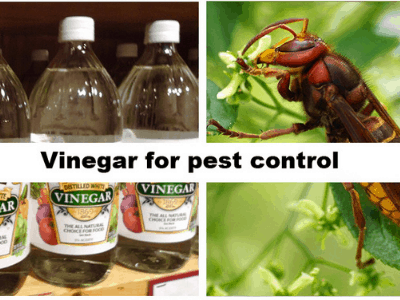
Slugs and snails get killed when you apply apple cider vinegar to them in the garden…
If you spray it on these insects, they’ll disappear…
You can increase the amount of solution by mixing equal amounts of vinegar with water…
Avoid drenching any plant foliage with undiluted vinegar…
Keep Cats and Dogs Away from the Garden
If your curious pet lets loose in your garden or if your rodents ruin your peace in there…
… pre-soaking some rags in the apple cider vinegar solution will assure that they won’t disturb you there.
Re-soak the rags every week to maintain the effectiveness…
You can also spray undiluted apple vinegar around the place around which you want to have your dog stay away…
Clean Old and Rusty Garden Tools

Garden tools that are metallic tend to rust…
Rust occurs as the iron oxidizes due to atmospheric oxygen and moisture…
You can get rid of this problem by spraying apple cider vinegar directly…
… on rusty parts of the tools and wiping them off with a damp cloth.
If the stains are particularly stubborn, place the tools in a mug or bucket…
… containing pure apple cider vinegar for approximately a day.
Make Old Clay Pots New Again
Clean the clay pots by scrubbing them off any dirt adhered to them…
Next, put them in a solution of 4 cups of water, 1 cup of apple cider vinegar…
… and 1 teaspoon dishwashing liquid for at least 1 hour.
Afterward, take out your pots and rub them gently with a damp cloth…
Once you have finished the process, rinse them in normal water to make them as clean as new…
It is possible that your pots could be very filthy, so you may need to soak them in this solution for 24 hours…
Get Rid of Ants
If you use apple cider vinegar as a repellent for ants…
… mix equal quantities of it with water and shake the spray bottle.
You can spray it on ant trails and ant hills in your home or garden. It works like a charm!
Make Your Soil More Acidic
Many garden plants like acidic soil, such as cranberries, azaleas, and camellias…
They need a lower pH level, and apple cider vinegar helps you with that if your soil is alkaline…
It is imperative that you continually monitor the pH of the soil…
… and measure the amount of apple cider vinegar you are adding to the soil.
Typically, half to one quart of ACV can be mixed with a gallon of water…
The solution should then be applied using a watering can to the soil…
Weed Killer
You can use Apple cider vinegar to kill weeds. It works well and is also safe…
Mix about two cups of apple cider vinegar with half cup of Epsom salt and one gallon of water…
… then apply directly to weeds.
To sum it up…
Apple cider vinegar has plenty of benefits for your garden…
If you somehow have leftover apple cider vinegar…
… or just wanting to give it a try, do it!
There’s nothing to lose, and maybe you will even put them into your routine…
You can either use them as a pesticide, insecticide, or rooting hormone…
Refer to our article above and find which suits you best…
Conclusion
If you happen to have any further queries, comment down below…
… or contact us for personal engagements.
Check out more posts in this website like this one here!
Have an awesome gardening journey!

